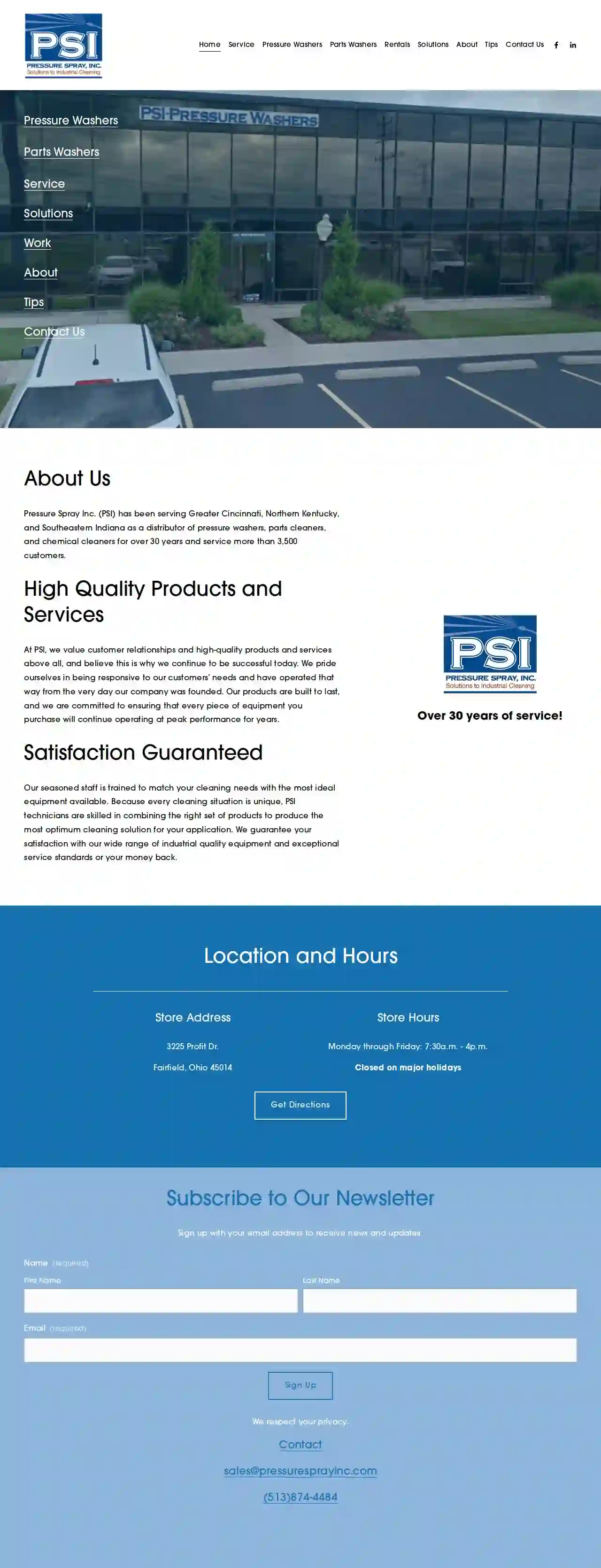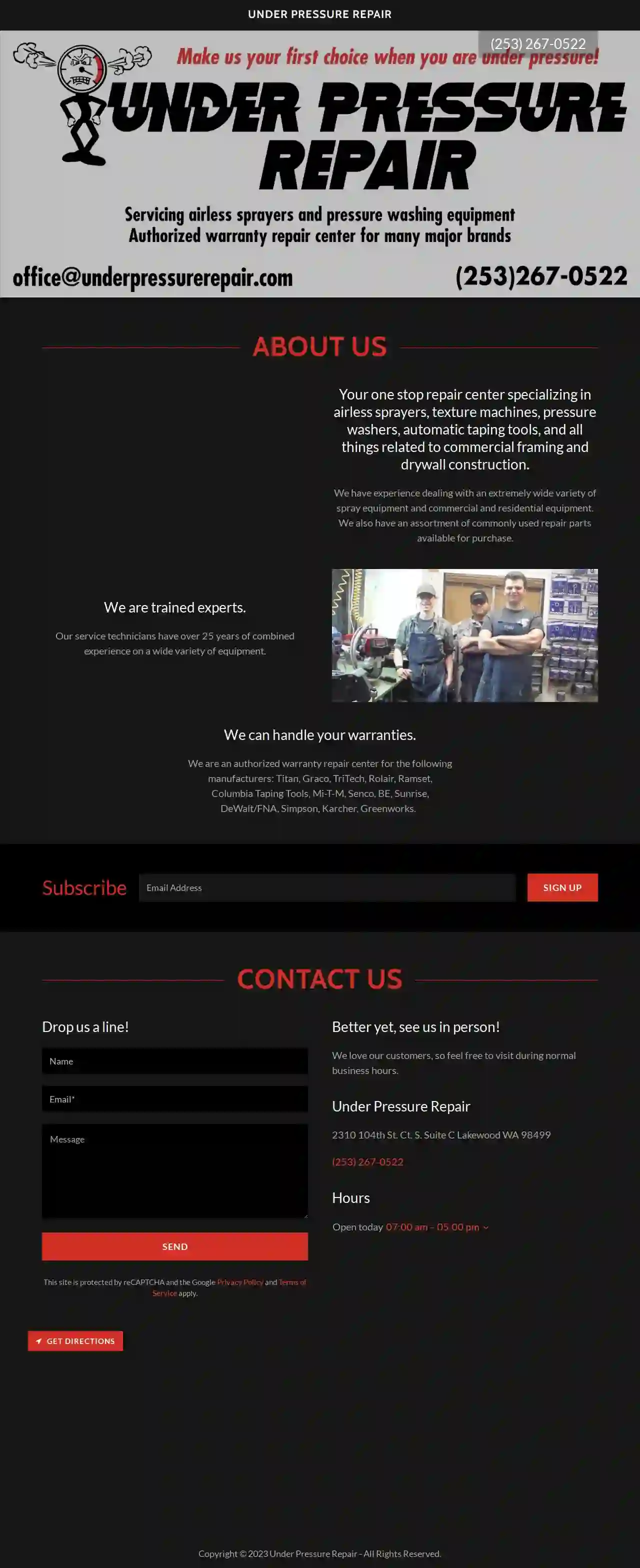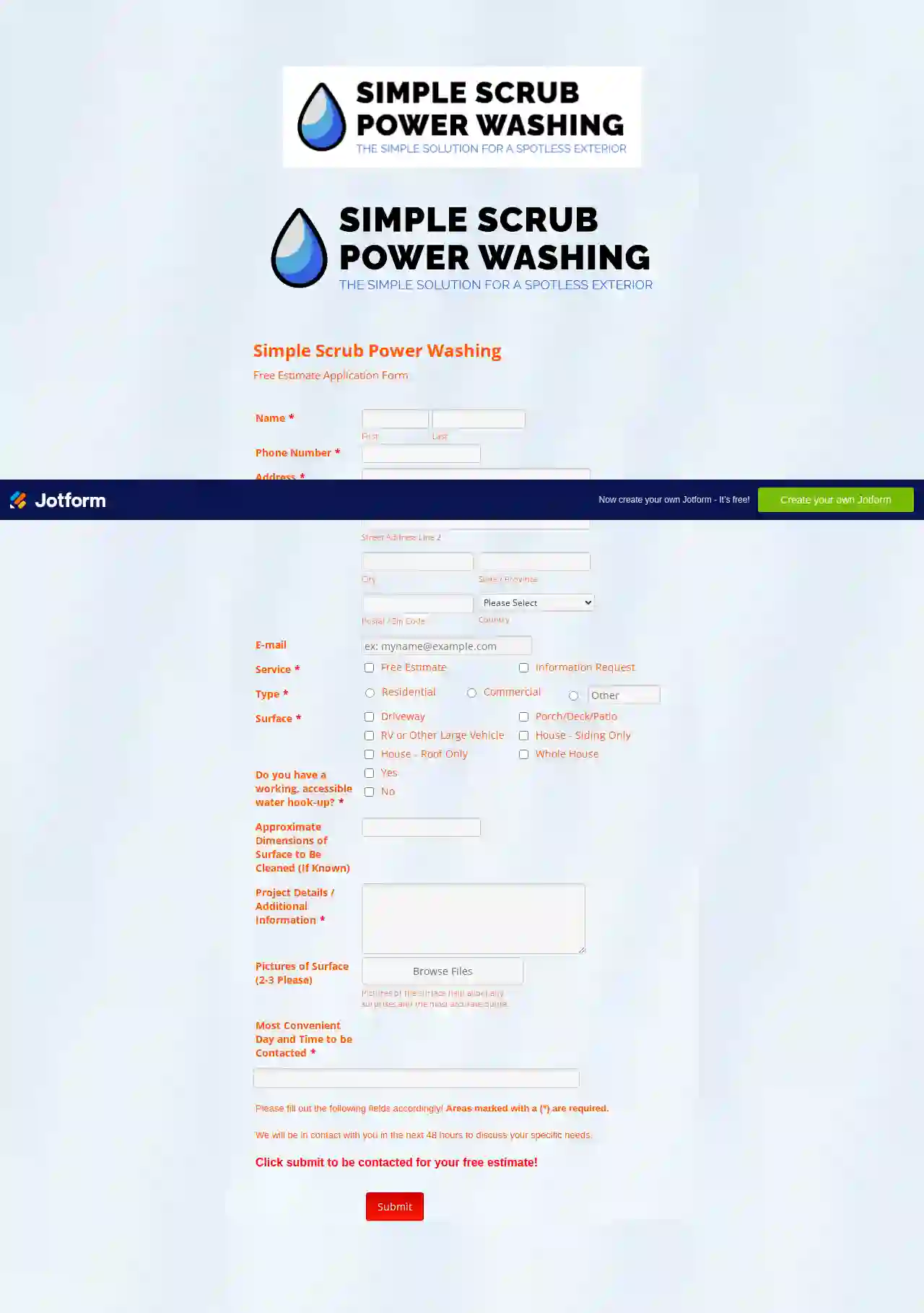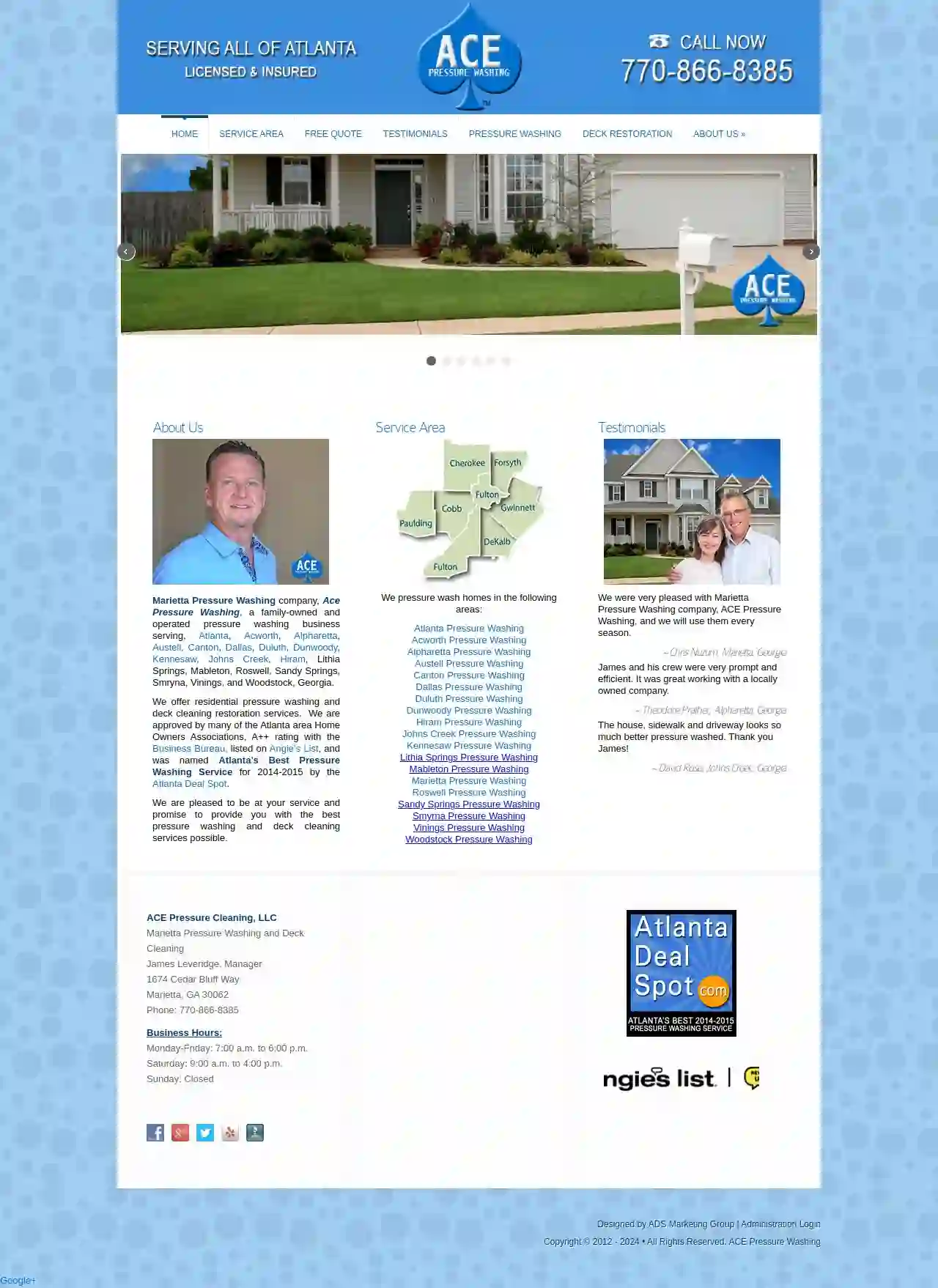Pressure Washing Johnstown
Find top Power Washing in Johnstown
Get multiple Driveway Cleaning quotes for your project today! Compare profiles, reviews, accreditations, portfolio, etc... and choose the best service.

Miami Valley Pressure Washing
560 reviewsVandalia, OH, 45377, USMiami Valley Pressure Washing, LLC is a full service pressure washing company that offers a wide variety of services to brighten and refresh nearly all of the exterior surfaces of your residential or commercial property. From the mold and mossy growth on siding and roofs, to the stubborn grime on concrete surfaces, we are equipped to clean it all! We strive to make you proud of the appearance of your home or business. Our beginnings were humble, starting with a single small pressure washer, a truck bed and a lot of hard work and dedication. We have grown to a much larger scale and have the capability of cleaning a wide variety of problem areas that detract from the appearance of your property. We are in the business of making people happy. We want the services we provide to make you proud of the appearance of your property. We are an honest, hard-working company that takes pride in what we do. We are experienced and reliable. We would love the opportunity to work for you to transform your property back to the beautiful state it was designed to be.
- Services
- Why Us?
- Our Team
- Testimonials
- Gallery
Get Quote
Pressure Spray Inc
4.813 reviews3225 Profit Dr., Fairfield, 45014, USPressure Spray Inc. (PSI) has been serving Greater Cincinnati, Northern Kentucky, and Southeastern Indiana as a distributor of pressure washers, parts cleaners, and chemical cleaners for over 30 years, servicing more than 3,500 customers. At PSI, we value customer relationships and high-quality products and services above all, and believe this is why we continue to be successful today. We pride ourselves in being responsive to our customers’ needs and have operated that way from the very day our company was founded. Our products are built to last, and we are committed to ensuring that every piece of equipment you purchase will continue operating at peak performance for years. Our seasoned staff is trained to match your cleaning needs with the most ideal equipment available. Because every cleaning situation is unique, PSI technicians are skilled in combining the right set of products to produce the most optimum cleaning solution for your application. We guarantee your satisfaction with our wide range of industrial quality equipment and exceptional service standards or your money back.
- Services
- Why Us?
- Gallery
Get Quote
Pressure Washing Woodstock
4.34 reviews536 Brooksdale Drive, Woodstock, 30189, USPressure Washing Woodstock is a professional pressure washing company serving Woodstock, GA. We specialize in providing top-quality pressure washing services to residential and commercial properties. Our team of experienced pressure washers uses the best equipment and techniques to remove mold, mildew, dirt, and grime from various surfaces, including stucco, brick, wood, siding, and stone. We pride ourselves on providing exceptional service, ensuring that our customers receive a professional-quality job every time. Whether you need a residential or commercial pressure washing service, we are here to help. Our services include house pressure washing, commercial pressure washing, roof cleaning services, deck and patio cleaning service, driveway and sidewalk cleaning service, fence cleaning service, parking lot pressure washing, and graffiti removal. Contact us today to schedule your appointment and experience the best pressure washing service in Woodstock, GA.
- Services
- Why Us?
- Gallery
Get Quote
Under Pressure Repair
516 reviews2310 104th St. Ct. S., Suite C, Lakewood, 98499, USUnder Pressure Repair is your one-stop repair center specializing in airless sprayers, texture machines, pressure washers, automatic taping tools, and all things related to commercial framing and drywall construction. We have experience dealing with an extremely wide variety of spray equipment and commercial and residential equipment. We also have an assortment of commonly used repair parts available for purchase. Our service technicians have over 25 years of combined experience on a wide variety of equipment. We can handle your warranties. We are an authorized warranty repair center for the following manufacturers: Titan, Graco, TriTech, Rolair, Ramset, Columbia Taping Tools, Mi-T-M, Senco, BE, Sunrise, DeWalt/FNA, Simpson, Karcher, and Greenworks.
- Services
- Why Us?
- Gallery
Get Quote
Perfect Power Wash
4.6Akron, USPerfect Power Wash is a professional power washing company serving Northeast Ohio. They offer a range of services including holiday light installation, house washing, concrete washing and sealing, roof treatment, soft wash services, commercial wash services, annual power washing, brick and stone power wash, and wood power wash. They highlight their team of trained professionals and offer a free quote.
- Services
- Why Us?
- Gallery
Get Quote
Simple Scrub Power Washing
57 reviewsAkron, USSimple Scrub Power Washing is your go-to solution for all your pressure washing needs. We offer a wide range of services to keep your property looking its best, from driveways and decks to entire houses. Our team of experienced professionals uses the latest equipment and techniques to ensure a thorough and efficient clean. We are committed to providing our customers with exceptional service and results.
- Services
- Why Us?
- Gallery
Get Quote
Grime Fighter Soft Wash
520 reviews123 Main St, Masury, Ohio, 44446, USGrime Fighter Soft Wash specializes in restoring the beauty and cleanliness of your residential & commercial property. Our services include house washing, deck, driveway, gutter cleaning, roof wash & more.
- Services
- Why Us?
- Accreditations
- Our Team
- Testimonials
- Gallery
Get Quote
Ace Pressure Washing
4.726 reviews1674 Cedar Bluff Way, Marietta, 30062, USAce Pressure Washing is a family-owned and operated pressure washing business serving Atlanta, Acworth, Alpharetta, Austell, Canton, Dallas, Duluth, Dunwoody, Kennesaw, Johns Creek, Hiram, Lithia Springs, Mableton, Roswell, Sandy Springs, Smyrna, Vinings, and Woodstock, Georgia. We offer residential pressure washing and deck cleaning restoration services. We are approved by many of the Atlanta area Home Owners Associations, A++ rating with the Business Bureau, listed on Angie’s List, and was named Atlanta’s Best Pressure Washing Service for 2014-2015 by the Atlanta Deal Spot.
- Services
- Why Us?
- Accreditations
- Our Team
- Testimonials
- Gallery
Get Quote
Great American Soft Wash
576 reviewsCincinnati, OH, 123 Main St, 45249, USGreat American Soft Wash is a soft washing and pressure washing company serving the Greater Cincinnati area. We offer a range of services including house washing, roof cleaning, gutter cleaning, concrete cleaning, stain removal, window cleaning, and Christmas lighting installation. Our team is dedicated to providing top-quality services that are safe, fast, and affordable. We work with homeowners, businesses, and property managers to keep their properties looking their best.
- Services
- Why Us?
- Accreditations
- Gallery
Get Quote
Roswell Pressure Washing
54 reviewsRoswell, GA, 123 Main St, 30076, USRoswell Pressure Washing is a power washing company based in Roswell, GA. We offer residential and commercial pressure washing services, including eco-friendly and biodegradable solutions and high-grade equipment. Our technicians are certified and active members of the PWRA and PWNA, and we participate in ongoing education and required training to guarantee we can meet all of the needs of our customers. We provide a range of services, including patio cleaning, roof cleaning, driveway cleaning, deck cleaning, and more. Contact us today to schedule a free estimate!
- Services
- Why Us?
- Accreditations
- Gallery
Get Quote
Over 60,241+ Cleaning Companies onboarded
Our janitorial service providers operate in Johnstown and surrounding areas!
CleaningMatch has curated and vetted Top Cleaning Companies near Johnstown. Find a top & reliable business today.
Frequently Asked Questions About Pressure Washing
- Soft Washing: Soft washing is generally recommended for wood decks as it uses lower pressure and specialized cleaning solutions to safely remove dirt, mildew, and algae without causing damage.
- Lower Pressure Setting: If using a pressure washer on a wood deck, use a lower pressure setting (around 1500 PSI) and a wide-angle nozzle (25-40 degrees).
- Maintain Distance: Hold the nozzle at least 12 inches away from the deck surface to prevent etching or splintering.
- Professional Pressure Washing: If you're unsure about pressure washing your deck safely, hire a professional pressure washing company with experience in cleaning wood surfaces.
- Pressure Washing: Suitable for hard surfaces like concrete, brick, stone, and decks that can withstand high pressure. Effective for removing stubborn dirt, grime, and stains.
- Soft Washing: Best for delicate surfaces like roofs, siding, painted surfaces, and wood fences that may be damaged by high pressure. Effective for removing mold, mildew, algae, and other contaminants without causing harm.
- Clear Obstructions: Remove any objects, furniture, or debris from the areas to be pressure washed.
- Close Windows and Doors: Securely close all windows and doors to prevent water or cleaning solutions from entering your home or building.
- Cover Delicate Surfaces: Protect delicate plants, landscaping, or electrical outlets with tarps, plastic sheeting, or painter's tape.
- Inform Your Neighbors: It's a courtesy to inform your neighbors about the scheduled pressure washing, especially if noise or overspray is a concern.
- Communicate Special Instructions: Inform the pressure washing company about any specific areas you want them to focus on or avoid.
- Enhanced Curb Appeal: Pressure washing removes dirt, grime, and stains, instantly revitalizing the appearance of your property and boosting curb appeal.
- Improved Health and Safety: Pressure washing removes mold, mildew, algae, and other contaminants that can pose health risks and create slippery surfaces.
- Increased Property Value: A well-maintained exterior, achieved through regular pressure washing, can increase the value of your property.
- Preventative Maintenance: Pressure washing removes dirt and grime that can deteriorate surfaces over time, extending the lifespan of your driveway, deck, fence, and other exterior features.
- Preparation for Painting or Staining: Pressure washing is an essential step before painting or staining, as it provides a clean and receptive surface for the new coating to adhere to.
Can pressure washing damage my deck?
By using the right cleaning method and precautions, you can effectively clean your wood deck without causing damage and prolong its lifespan.
How do I know if I need pressure washing or soft washing?
If you're unsure which method is best for your surfaces, consult with a professional pressure washing company. They can assess your needs and recommend the most appropriate cleaning method.
How do I prepare my property for pressure washing?
By taking these preparatory steps, you can ensure a safe and efficient pressure washing experience.
What are the benefits of pressure washing?
Whether you're looking to improve your property's appearance, protect its value, or enhance health and safety, pressure washing is a valuable investment.
Can pressure washing damage my deck?
- Soft Washing: Soft washing is generally recommended for wood decks as it uses lower pressure and specialized cleaning solutions to safely remove dirt, mildew, and algae without causing damage.
- Lower Pressure Setting: If using a pressure washer on a wood deck, use a lower pressure setting (around 1500 PSI) and a wide-angle nozzle (25-40 degrees).
- Maintain Distance: Hold the nozzle at least 12 inches away from the deck surface to prevent etching or splintering.
- Professional Pressure Washing: If you're unsure about pressure washing your deck safely, hire a professional pressure washing company with experience in cleaning wood surfaces.
By using the right cleaning method and precautions, you can effectively clean your wood deck without causing damage and prolong its lifespan.
How do I know if I need pressure washing or soft washing?
- Pressure Washing: Suitable for hard surfaces like concrete, brick, stone, and decks that can withstand high pressure. Effective for removing stubborn dirt, grime, and stains.
- Soft Washing: Best for delicate surfaces like roofs, siding, painted surfaces, and wood fences that may be damaged by high pressure. Effective for removing mold, mildew, algae, and other contaminants without causing harm.
If you're unsure which method is best for your surfaces, consult with a professional pressure washing company. They can assess your needs and recommend the most appropriate cleaning method.
How do I prepare my property for pressure washing?
- Clear Obstructions: Remove any objects, furniture, or debris from the areas to be pressure washed.
- Close Windows and Doors: Securely close all windows and doors to prevent water or cleaning solutions from entering your home or building.
- Cover Delicate Surfaces: Protect delicate plants, landscaping, or electrical outlets with tarps, plastic sheeting, or painter's tape.
- Inform Your Neighbors: It's a courtesy to inform your neighbors about the scheduled pressure washing, especially if noise or overspray is a concern.
- Communicate Special Instructions: Inform the pressure washing company about any specific areas you want them to focus on or avoid.
By taking these preparatory steps, you can ensure a safe and efficient pressure washing experience.
What are the benefits of pressure washing?
- Enhanced Curb Appeal: Pressure washing removes dirt, grime, and stains, instantly revitalizing the appearance of your property and boosting curb appeal.
- Improved Health and Safety: Pressure washing removes mold, mildew, algae, and other contaminants that can pose health risks and create slippery surfaces.
- Increased Property Value: A well-maintained exterior, achieved through regular pressure washing, can increase the value of your property.
- Preventative Maintenance: Pressure washing removes dirt and grime that can deteriorate surfaces over time, extending the lifespan of your driveway, deck, fence, and other exterior features.
- Preparation for Painting or Staining: Pressure washing is an essential step before painting or staining, as it provides a clean and receptive surface for the new coating to adhere to.
Whether you're looking to improve your property's appearance, protect its value, or enhance health and safety, pressure washing is a valuable investment.